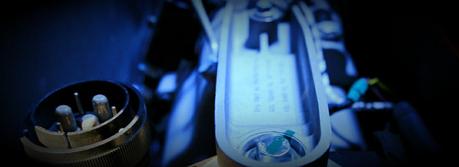 The Tesla Roadster is powered by a 3-phase, 4-pole induction motor, producing a maximum net power of 248 hp (185 kW). (Credit: Flickr @ Steve Jurvetson http://www.flickr.com/photos/jurvetson/).
The Tesla Roadster is powered by a 3-phase, 4-pole induction motor, producing a maximum net power of 248 hp (185 kW). (Credit: Flickr @ Steve Jurvetson http://www.flickr.com/photos/jurvetson/).Large-scale mass production of flexible, efficient and lightweight electric motors is one the missing links required for wider implementation of electric mobility. New lightweight construction concepts will be able to reduce vehicle weight and, hence, energy consumption during acceleration. While lightweight construction of the car body is already highly developed, there is still work to be done on reducing the weight of electric motors. Development of technologies for mass production is the objective of the “ProLeMo” project, in which Karlsruhe Institute of Technology (KIT) is one of the partners.
Stationary electric motors currently reach a high efficiency of up to 95%. Flexible series production of parts and models of electric motors, however, still is a big challenge in production technology. In addition, the ratio between motor power and motor weight—the power to weight ratio—is to be increased in order to reduce the weight of the complete vehicle. “For this purpose, new materials have to be integrated in the motors. Moreover, production of motor components has to be simplified,” Manuel Peter from KIT’s Institute of Production Science (wbk) explains. To master these challenges, the ProLeMo project partners from industry and science pursue a holistic and integrated interdisciplinary approach.
Under ProLeMo, the Institute of Production Science studies solutions for the use of fiber-reinforced plastics in the electric motor. Within the next three years, the scientists will establish the process chain needed for the production of a demonstrator. It is planned to produce the rotor, stator, and housing with integrating cooling. The Institute of Vehicle System Technology (FAST) will develop components made of fiber composites. Use of modern simulation tools will guarantee that these components will meet the operation requirements.
The project partners possess the expertise required for the project. The project is coordinated by WITTENSTEIN cyber motor GmbH, a company specialized in the development and manufacture of permanently excited high-performance synchronous motors. In the area of injection molding technology, ARBURG GmbH + Co KG will work on alternative materials for motor components to be produced by injection molding. Cutting and fiber deposition work will be performed using the lasers and milling machines of the INDEX-Werke GmbH & Co. KG Hahn & Tessky. Aumann GmbH is responsible for the development of the process and machines to manufacture the coils required. On the part of research, the Institute of Production Science (wbk) and the Institute of Vehicle System Technology (FAST) of Karlsruhe Institute of Technology (KIT) support the project that has a duration of three years.
The research project in the total amount €3.3 million (approx. $ 4.33 million) is financed by the Federal Ministry of Economics (BMWi) providing €1.7 million. The project is managed by the German Aerospace Center (DLR).
The project’s website (in German)

